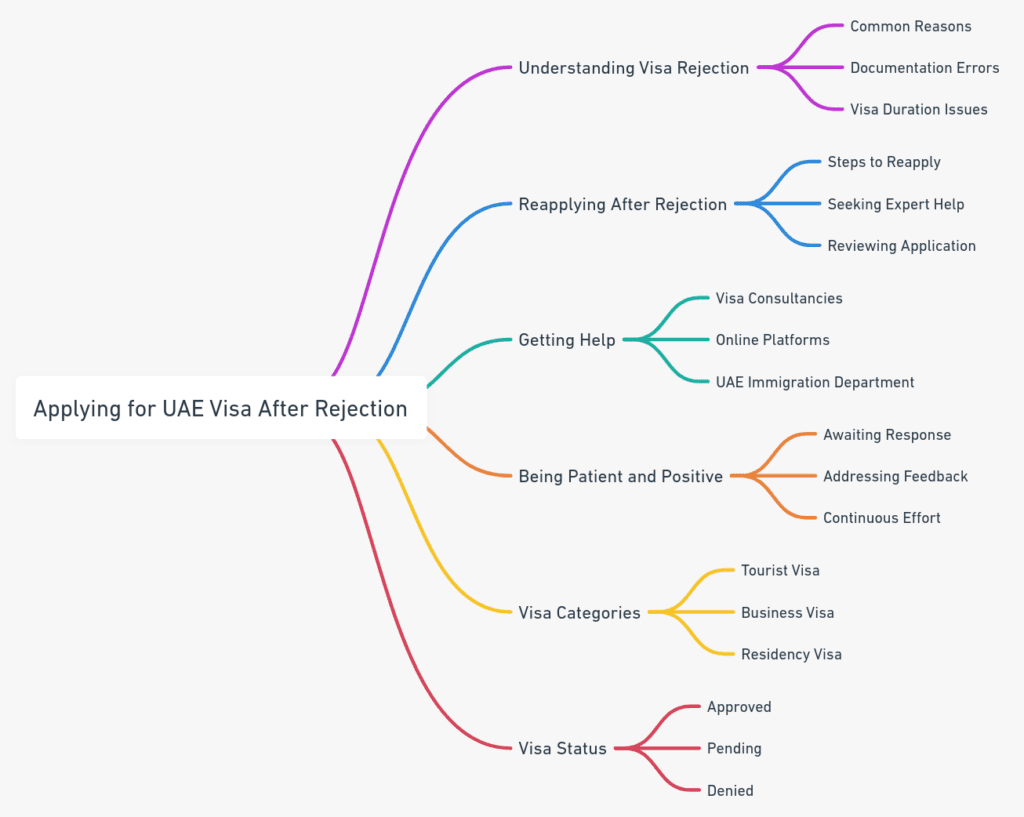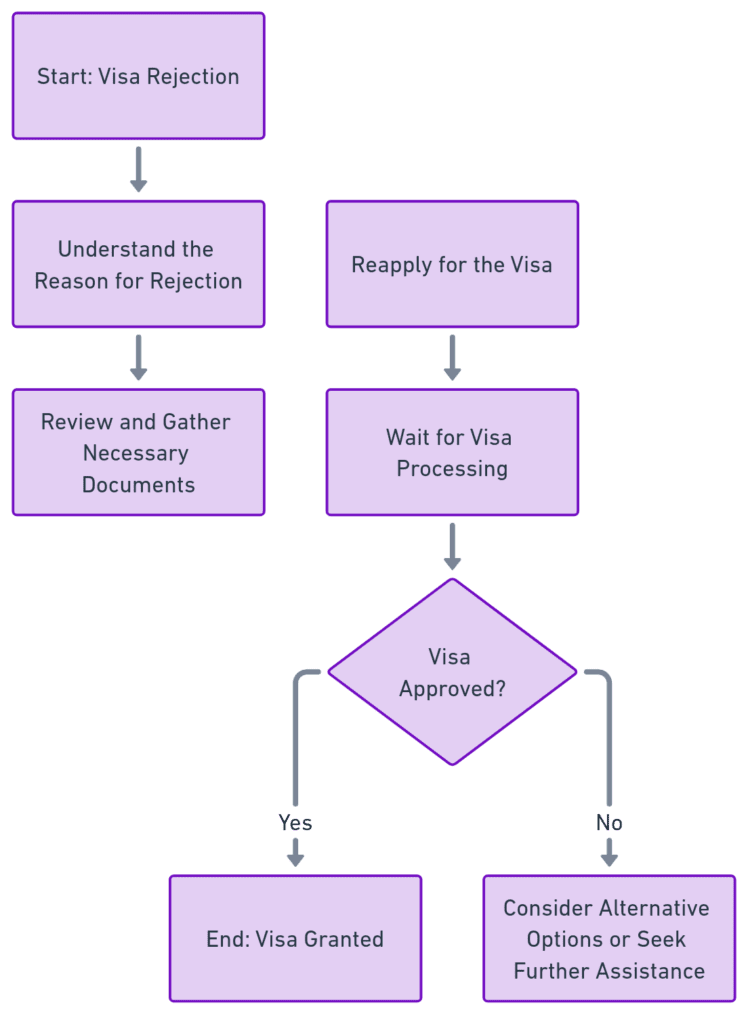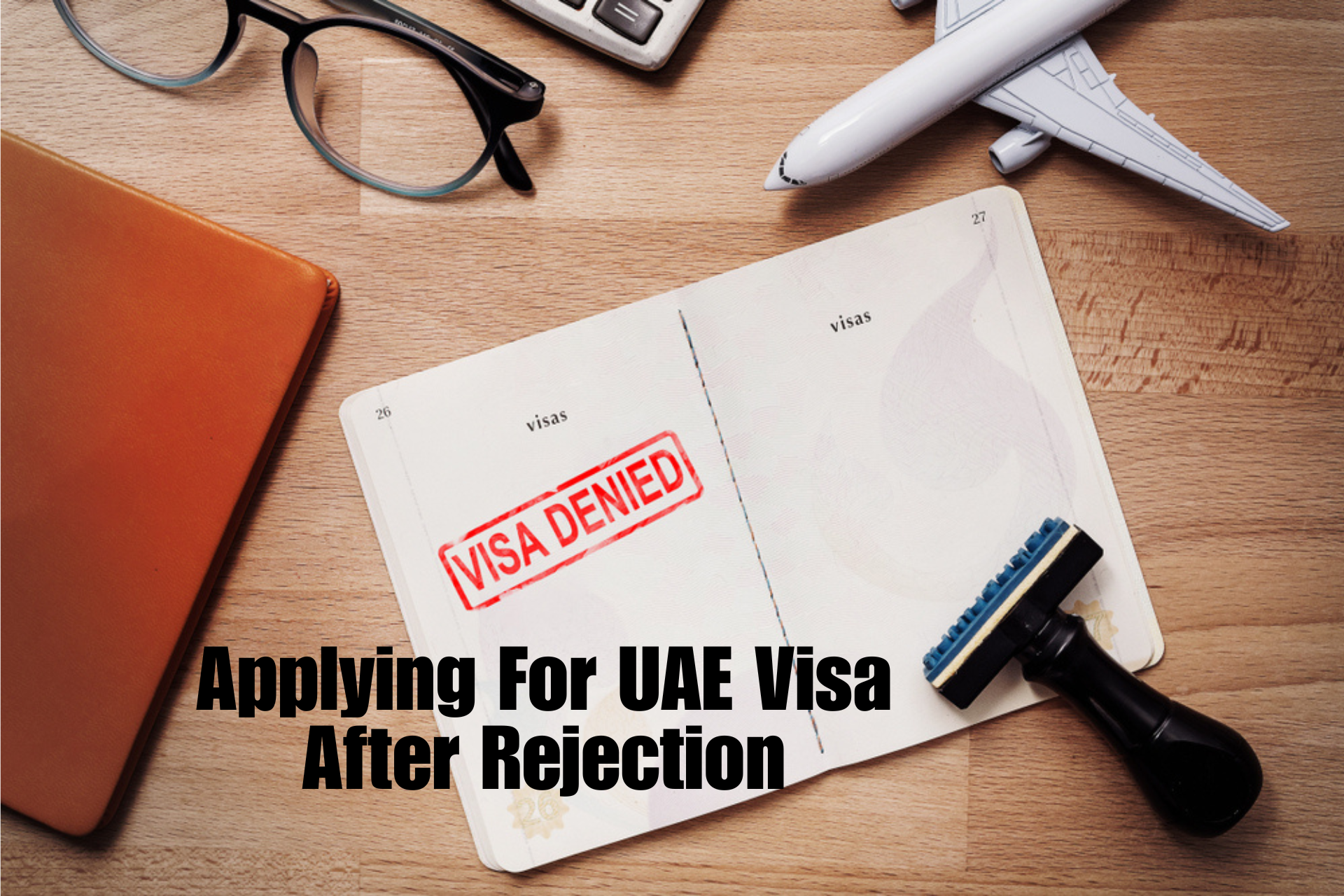Introduction
The United Arab Emirates, with its bustling cities and thriving economy, is a sought-after destination for many. Whether you’re aiming for a business venture, a job opportunity, or simply a visit, obtaining a UAE visa is the first step. But what happens when your visa application faces rejection? It can be disheartening, but it’s essential to know that many face this hurdle. This guide aims to shed light on the reasons behind visa rejections and the path forward. Ever faced a UAE visa rejection? You’re not alone, and there’s a structured way to navigate this challenge.


Understanding Visa Rejections
Visa rejections can stem from various reasons, ranging from missing documents to discrepancies in the application. It’s crucial to understand the specific reason for your visa denial. The rejection letter usually provides insights, but sometimes it might be vague. In such cases, reaching out to the concerned authorities or seeking expert advice can be beneficial.
Steps to Take After Visa Rejection
Facing a visa rejection can be disheartening, but it’s essential to approach the situation with a clear mind and a structured plan. Here’s a detailed breakdown of the steps you should consider:
1. Reviewing the Rejection Letter
- Understand the Reason: The rejection letter is your primary source of understanding why your visa application was denied. It will typically outline the specific reasons for the rejection.
- Seek Clarification: If the letter is vague or you’re unsure about the reasons mentioned, don’t hesitate to contact the UAE embassy or consulate for further clarification.
2. Document Verification
- Check for Completeness: Ensure that you submitted all required documents. Sometimes, an omission can lead to rejection.
- Accuracy is Key: Verify that all the details in your documents are accurate. Even minor discrepancies can lead to visa denials.
- Update Expired Documents: Ensure that none of your documents, like passports or certificates, are expired.
3. Consultation
- Seek Expert Advice: Consider consulting with visa experts or agencies that specialize in UAE visas. They can provide valuable insights based on their experience.
- Legal Counsel: In some cases, especially if you believe there was an error in the rejection, seeking legal advice can be beneficial.
4. Reapplication
- Address the Issues: Before reapplying, ensure that you’ve addressed all the reasons mentioned in the rejection letter.
- Gather Additional Documents: Sometimes, providing additional supporting documents can strengthen your application.
- Follow the Guidelines: Ensure that you adhere to all the guidelines and requirements when reapplying.
5. Awaiting Response
- Stay Patient: The visa application process can be time-consuming. Once you’ve reapplied, it’s essential to wait patiently for a response.
- Stay Updated: Regularly check the status of your application online or through the agency you applied with.
- Be Prepared: The visa authorities might request additional information or documents. Ensure you provide them promptly.
6. Consider Alternative Options
- Different Visa Category: If you’ve faced multiple rejections for a specific visa category, consider if you’re eligible for a different type of visa.
- Explore Other Avenues: Some programs or initiatives might offer alternative pathways to enter the UAE. Research and see if you qualify for any.
By following these steps meticulously and ensuring that you address the reasons for the initial rejection, you can enhance your chances of obtaining a UAE visa on subsequent attempts.
Common Mistakes & How to Avoid Them?
Navigating the visa application process can be intricate, and even minor oversights can lead to rejection. Here’s a comprehensive look at the frequent pitfalls and how to steer clear of them:
1. Incomplete Application Forms
- Mistake: Leaving sections of the application form blank or not providing all the necessary details.
- Solution: Always review the application form multiple times to ensure every section is filled out. If a particular section doesn’t apply to you, mention “N/A” or “Not Applicable.”
2. Incorrect or Outdated Documents
- Mistake: Submitting documents that have errors or are no longer valid.
- Solution: Double-check all documents for accuracy. Ensure that your passport has a minimum validity—usually six months—from the intended date of entry.
3. Insufficient Financial Proof
- Mistake: Not providing adequate evidence to show you can support yourself during your stay in the UAE.
- Solution: Attach bank statements, salary slips, or any other financial documents that can vouch for your financial stability.
4. Lack of Travel History
- Mistake: If you’ve never traveled internationally, it might raise concerns about your intent.
- Solution: While you can’t change your travel history instantly, consider visiting countries with more lenient visa policies first to build a travel record.
5. Overlooking the Purpose of Visit
- Mistake: Not clearly specifying the reason for your visit.
- Solution: Clearly state your purpose, whether it’s tourism, business, or visiting family. Attach any supporting documents, like invitation letters or hotel bookings.
6. Mismatched Information
- Mistake: Providing inconsistent information across different documents or sections of the application.
- Solution: Ensure that all details, such as names, addresses, and dates, are consistent throughout your application.
7. Not Considering Previous Rejections
- Mistake: Reapplying without addressing the reasons for previous visa rejections.
- Solution: Before reapplying, thoroughly understand the reasons for past rejections and make sure to rectify them in your new application.
8. Submitting Unnecessary Documents
- Mistake: Overloading your application with irrelevant documents, thinking it might help.
- Solution: Only submit documents that are requested or directly support your application. Quality over quantity is the key.
9. Not Checking Visa Validity
- Mistake: Assuming the visa is valid from the date of entry rather than the date of issue.
- Solution: Always check the validity dates on your visa and plan your travel accordingly.
10. Delay in Application
- Mistake: Applying too close to your intended travel date, leaving no room for processing delays.
- Solution: It’s advisable to apply well in advance, keeping in mind the processing time and any potential delays.
By being vigilant and avoiding these common mistakes, applicants can significantly improve their chances of securing a UAE visa without any hitches.
Benefits of Seeking Expert Guidance
Navigating the visa application process can be intricate. Experts, with their in-depth knowledge, can:
- Offer insights into the application process.
- Help address potential issues in your application.
- Enhance the chances of visa approval by ensuring all criteria are met.
Alternative Paths After Repeated Rejections
Facing multiple visa rejections can be disheartening, but it’s essential to remember that there are always alternative routes to explore. Here are some strategies and alternative paths to consider:
1. Consult with a Visa Expert or Legal Counsel
- Overview: Visa experts or immigration lawyers have in-depth knowledge of the visa application process and can provide insights into why your application might be getting rejected.
- Action: Seek out reputable visa consultancy services or immigration lawyers in the UAE. They can review your application, identify potential issues, and guide you on the best course of action.
2. Consider a Different Visa Type
- Overview: The UAE offers various visa types, such as tourist, business, student, or transit visas. If one visa type is continually getting rejected, you might have better luck with another.
- Action: Research the different visa categories available and see which one aligns best with your purpose and credentials.
3. Explore Sponsorship Options
- Overview: Having a local sponsor, whether it’s a family member, friend, or employer in the UAE, can bolster your visa application.
- Action: If you have contacts in the UAE, discuss the possibility of them sponsoring your visa. Ensure that they meet the sponsorship criteria set by the UAE government.
4. Attend Visa Application Workshops
- Overview: Some organizations offer workshops to guide applicants through the visa application process, highlighting common mistakes and best practices.
- Action: Look for workshops or seminars in your region or online. Participating can provide valuable insights and improve your chances in future applications.
5. Consider Other Destinations
- Overview: If your heart is set on experiencing the Middle East, but the UAE remains elusive, consider visiting nearby countries first.
- Action: Countries like Oman, Bahrain, or Saudi Arabia might have different visa regulations. Building a travel history in the region can potentially strengthen future UAE visa applications.
6. Reapply After a Significant Time Gap
- Overview: Instead of reapplying immediately after a rejection, consider waiting for a while. During this time, you can work on strengthening your application.
- Action: Focus on building a stable financial record, gaining international travel experience, or gathering stronger supporting documents before reapplying.
7. Engage in Cultural and Business Exchanges
- Overview: Participating in cultural or business exchange programs can provide an alternative route to enter the UAE.
- Action: Research organizations or institutions that offer exchange programs with the UAE. Such programs often have a different visa process, which might be more lenient.
While repeated visa rejections can be frustrating, it’s crucial to stay persistent and explore all available avenues. With the right approach and guidance, you can increase your chances of successfully obtaining a UAE visa.
Frequently Asked Questions (FAQs)
Why was my UAE visa application rejected?
There could be several reasons for a visa application rejection. Common reasons include incomplete application forms, lack of necessary documents, discrepancies in the application details, previous criminal record, or previous visa violations in the UAE. It’s essential to ensure that all details provided are accurate and that you meet all the visa requirements.
Can I reapply immediately after my visa is rejected?
Yes, you can reapply after a visa rejection. However, it’s advisable to understand the reason for the rejection and address it before reapplying. Sometimes, waiting for a while and making significant changes to your application or circumstances can increase the chances of approval.
How long does the visa appeal process take?
The visa appeal process duration can vary, but it typically takes a few weeks. It’s essential to provide all necessary documents and information promptly to expedite the process.
Is there a fee for the visa appeal process?
Yes, there’s usually a fee associated with the visa appeal process. The exact amount can vary depending on the type of visa and other factors. It’s advisable to check with the UAE’s immigration department or consulate for specific details.
What documents are required for the visa appeal process?
The required documents can vary based on the reason for rejection. Typically, you’d need to provide the original visa application, the rejection notice, any additional supporting documents that address the reason for rejection, and a letter stating the reasons for the appeal.
How many times can I appeal a visa rejection?
There’s no specific limit to the number of times you can appeal a visa rejection. However, repeated rejections might indicate fundamental issues with your application or eligibility. It’s essential to address these issues before reapplying or appealing.
What are the chances of success in the visa appeal process?
The success rate of the visa appeal process varies. If you can adequately address the reason for the initial rejection and provide strong supporting documents, your chances of a successful appeal increase.
Can a travel agency or consultant help with the visa appeal process?
Yes, many travel agencies and visa consultants offer services to assist with the visa appeal process. They can provide guidance on the required documents, the appeal letter, and other essential aspects of the process.
What should I do if my appeal is also rejected?
If your appeal is rejected, you can consider reapplying after a significant time gap, ensuring you address all the reasons for rejection. Alternatively, you can explore other visa types or seek legal counsel for further guidance.
Are there any restrictions on traveling to the UAE after a visa rejection?
A visa rejection doesn’t necessarily impose travel restrictions. However, if the rejection is due to serious reasons like criminal activity or security concerns, there might be restrictions. It’s essential to understand the reason for rejection and seek guidance if unsure.
To Sum It Up!
Imagine you want to visit a friend’s house, but the first time you ask, your friend’s parents say you can’t come over. It’s like getting a “no” when you ask for permission. But, just because you got a “no” once doesn’t mean you can’t ask again. Maybe you just need to ask in a different way or at a different time.
Similarly, when someone wants to visit the UAE, they need a special paper called a “visa.” Sometimes, the UAE might say “no” the first time someone asks. But that person can try again, maybe by filling out the form better or giving more information. And there are even special helpers who can give advice on how to ask in the best way!
Facing a UAE visa rejection can be a setback, but it’s not the end of the road. With the right information, guidance, and persistence, you can navigate the challenges and pave your way to a successful visa application. Stay informed, seek expert advice when in doubt, and always ensure your application is complete and accurate.









![Types Of Fines in the UAE – A Complete Guide [2024] Types Of Fines in the UAE - A Complete Guide [2023]](https://emiratesidbizhub.com/wp-content/uploads/2023/09/Types-Of-Fines-In-UAE-150x150.png)




